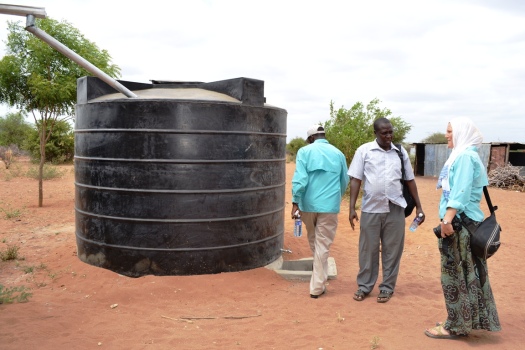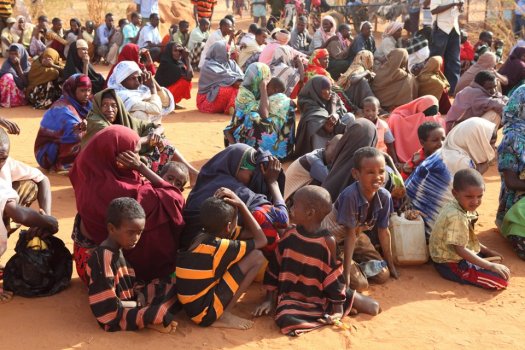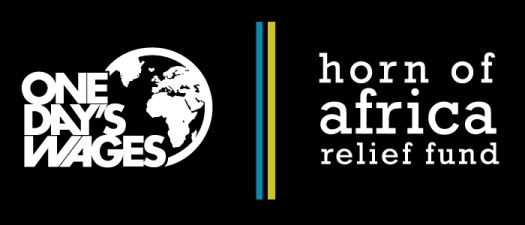Dear Friends, Supporters, Readers, and Encouragers:
I hope you’re doing well.
I’m writing to you from Kenya. Yes, you read that correctly. Kenya as in Kenya, Africa.
I just recently arrived and depending on circumstances, may also visit Somalia and South Sudan. Over the next week or so, I’m privileged to be a guest of World Concern (one of our main partners). We’re also joined by a representative from ONE. Together, we’ll have the opportunity to personally assess the progress and the arduous work ahead. Just this week, I read reports that the current situation in Somalia – while it improved last year – may be entering into another dire situation.
The Context
In 2011, the Horn of Africa experienced the worst drought in its region in 60 years. This drought in combination with rising food prices, extreme insecurity, and violence led to famine conditions that affected over 13 million people in the Horn of Africa. The Horn of Africa is the “horn” shaped portion of northeastern Africa that includes the countries of Somalia, Kenya, Ethiopia, and Djibouti.
In fact, the UN declared famine in six regions in Somalia. Tragically, hundreds of thousands of people were forced to flee their homes in search of food, water, and safety. Many of them walked for weeks, trying to reach refugee camps in Kenya. And sadly, many died along the way, including more than 30,000 children.
When tragedy strikes – whether it be in Aurora, Colorado or through a famine or drought in the Horn of Africa (and another current one in the Sahel region of Africa)…we are reminded of our finitude.
We can’t do everything…
As much as we want, we can’t fix everything.
We can’t change everything. We can’t make everything better but…
We can’t do nothing. We have do something.
We have to act.
This is part of why we started One Day’s Wages in 2009 – to enable and empower ‘the everyday person’ to do something. We can pray. We can raise awareness. We can contact our legislators and civic leaders. We can educate ourselves.
We can also gather resources to partner with organizations that are vetted, respected, and have a strategic plan for both short term relief and long term solutions – not just in response to crises but the ongoing fight to eradicate extreme poverty. It’s for these reasons that we partnered with World Concern, Adeso, and Concern Worldwide. In addition, we’ve been trying to plant 200,000 trees in Ethiopia with Eden Reforestation.
And you responded.
In fact, many responded and acted. From around the world. Many gave a few dollars. Some their one day’s wages. Numerous gave up their birthdays for the Horn of Africa Fund. Couple churches partnered with us. Several companies partnered with us. There were benefits and parties. Some cycled. Some ran. And umm, some cut their hair.
One of the more amazing stories was a woman named Anji who decided to shave her head…and raised over $18,000!
$171,347.87
In total (thus far), we’ve raised $171,347.87. Amazing.
How have these funds been used?
Food, water, and food vouchers. Providing essential resources like cooking pots, blankets, spoons, sleeping mats, and mosquito nets for those that have left their homes with practically nothing; Rainwater catchment systems (see picture below), latrines, and training. And the list goes on.
Thank you.
Thank you for doing your part. When a crisis impact over 13 million people, it doesn’t just require a village, it requires the entire world.
We covet your thoughts and prayers.
In fact, we’ve had to change our itinerary recently as two churches were recently bombed and attacked nearby the Dadaab refugee camp we were intended to visit. These attacks killed 15 people and wounded 40. In addition, 4 relief workers were recently kidnapped. Thankfully, all have since been freed.
In short, safety is the most important priority so we’ll have to altogether avoid some places in our initial itinerary.
I’m humbled and grateful for your support and prayers. I want you to know that I’m not here to be a part of “Humanitarian Tourism.” ODW is committed to the fight against extreme poverty for the long haul. Thus far, we’ve raised over $1.25 million dollars and 100% (minus credit card fees) are invested in projects around the world.
I’m humbled by your support, trust, and partnership. You’re still welcome to give the Horn of Africa Relief Fund because the need is still real and I also hope that you’ll consider donating your upcoming birthday to support the ODW project of your choosing.
Here, there, or everywhere, may we all be convicted to love God and love our neighbors. Amen.
*As I’m not able to have regular internet access, I’ll likely not be able to blog frequently. I’ll try to stay connected with micro-updates on my Twitter account or my FB page.

* Long term solution – ‘water catchment’ – implemented by World Concern through the support of ODW.

* These Somali refugees are lined up to be registered at the world’s largest refugee camp in Dadaab, Kenya — “home” to more than 400,000 people.

* This Somali refugee walked with her family for one month to escape the famine.
All photos courtesy of World Concern.


Thanks for this, Eugene. We believe in you and appreciate your leadership. Be safe!
thank you.
Thanks for your inspiring words. Will be praying for your safe travels!
Thank you, Julianna. Means much.
Eugene — Thank you, even after the headlines have “moved on,” for your steadfast compassion and leadership. May we not allow the overwhelming brokenness of the world to paralyze us. As you said, we can’t do everything but we can each do *something*.
Praying for you and your team.
Thank you, Daniel. Your prayers mean much
It’s been intense the past couple days walking a few steps of those that have walked nearly 200 miles looking for better circumstances.
Wow, stories worth hearing. Thanks for the update.
jason. thanks for your help.
so much need. so much need. so much need.
Praying….
While Getting Better does not reconstruct development, its realistically grounded optimism provides what I see as a potential foundation for a productive rethinking of efforts to help the global poor. Kenny chooses to begin from a realistic grounding, where Chapters 2 and 3 of the book present us with the bad news (global incomes are diverging) and the worse news (nobody is really sure how to raise growth rates). But, Kenny answers these challenges in three chapters that illustrate ways in which things have been improving over the past several decades, from sticking a fork in the often-overused idea of poverty traps to the recognition that quality of life measures appear to be converging globally. This is more than a counterweight to the literature of failure – this book is a counterweight to the literature of development that all-too-blindly worships growth as its engine. In this book, Kenny clearly argues that growth-centric approaches to development don’t seem to be having the intended results, and growth itself is extraordinarily difficult to stimulate . . . and despite these facts, things are improving in many, many places around the world. This opens the door to question the directionality of causality in the development and growth relationship: is growth the cause of development, or its effect?